The most life-changing books, statistically
Sifting through the self-help section for hidden knowledge
Three years ago, the CEO of Stripe tweeted about his friends curing their chronic back pain using Healing Back Pain, a controversial book from 1991. The book’s thesis is that a lot of physical pain is caused by repressed emotion, and that simply recognizing this connection can dramatically reduce the pain.
The co-founder of tech startup Thumbtack chimed in that his debilitating pain was cured just by reading the book’s reviews:
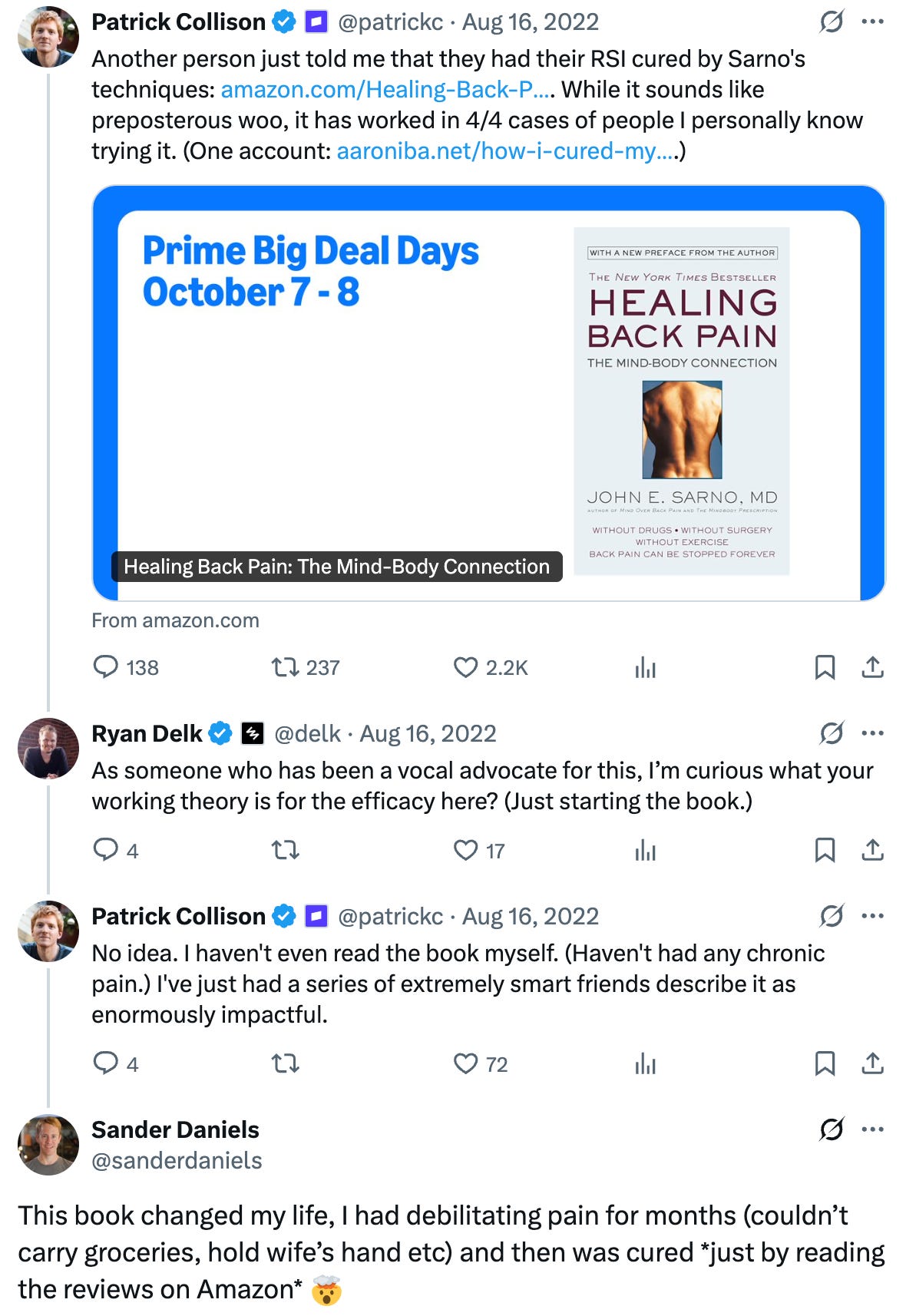
Can a book really do that? Can a book’s Amazon reviews really do that?
I don’t have much back pain these days, so I can’t personally test it (but if you do, please at least read its reviews and let me know).
It’s a seductive idea, that you can read a book and it will change the course of your life. I have found it to almost never be the case. Mostly my life bends with the ideas in the book I’m reading and then continues on its previous trajectory.
But it’s fun to explore books like these that had a profound impact on somebody. It feels like unmapped territory, a part of yourself waiting to be unlocked if you can find the key. So I found datasets of book reviews, from Amazon and Goodreads, and counted the reviews that call the book “life-changing” or similar. For example, here’s one such review of Healing Back Pain, which 6% of reviewers called life-changing:
The book that changed my life! This book is absolutely awesome. I have an extensive ballet background along with aerobics and general fitness practices. I have chronic low back pain which gets debilitating at times...until this book.
As you might expect, this analysis leads us deep into the self-help aisle. A lot of these books seem kind of ridiculous; they make fabulous claims and it’s hard to trust that your experience of the book would line up with the people in the reviews. That is why firsthand accounts by people who are credible in some way are so powerful; Collison being a billionaire fintech CEO means he presumably isn’t sharing Healing Back Pain for the affiliate fees.
You can explore all of the books in a google sheet here; I wandered through titles like The Psychology of Winning: The Ten Qualities of a Total Winner and looked for books I might connect with.
We have to balance the relative frequency of impactful reviews with its overall popularity. Plotting the books by total number of reviews on the x-axis and the % of people who call them life-changing on the y-axis, we can see some of outliers:
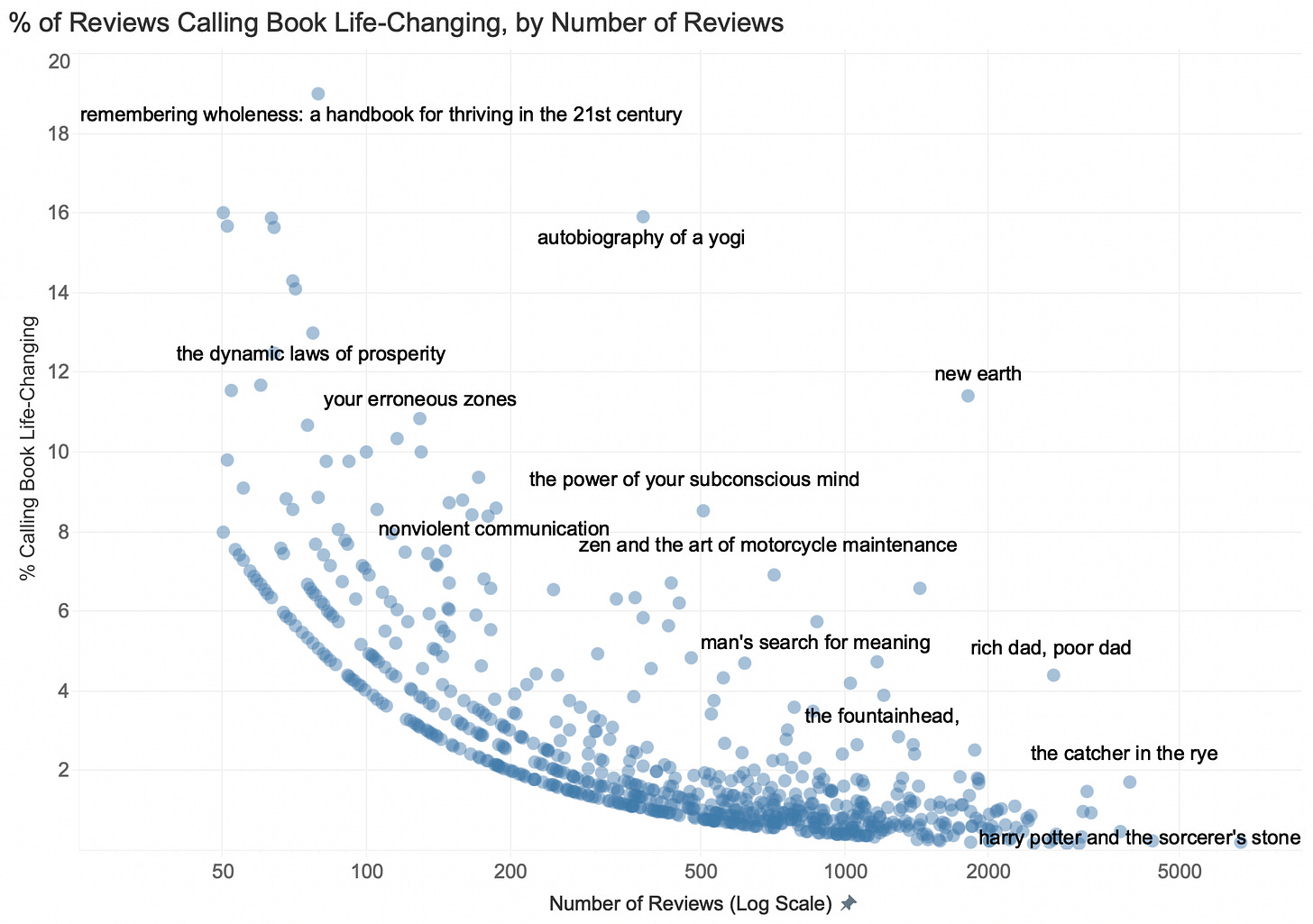
I had never heard of the book with the highest percentage of life-changing reviews: Remembering Wholeness, by Carol Tuttle. It is a self-help book that came out in 2003 and has the aesthetics to match:
It only had 79 reviews in this dataset, but 19% of them called the book life-changing, including this one:
Reading Carol Tuttle’s book, Remembering Wholeness, is one of the most life-changing events that i have ever experienced…Remembering Wholeness is like looking deep into your own soul and putting in that one crucial piece that connects the rest together.
Idk, why not? Maybe this is what we all need.
Autobiography of a Yogi by Paramahansa Yogananda heavily influenced The Beatles’ George Harrison and apparently attendees at Steve Jobs’ memorial service each received a copy. It has an extremely high rate of life-changing reviews for its scale, at 16% of the 377 reviews in this dataset; this account is particularly compelling:
This book changed my life beyond recognition. I started reading Autobiography in 1993, and will never forget my first experience in reading it. At one point in the early chapters, I suddenly felt a great suction pull my breath from my lungs and I was in another world, another realm moving around, observing my beautiful surroundings and apparently being guided.
Seems fun! I’m going to listen to it1.
New Earth by Eckhart Tolle was part of Oprah’s book club (still among the most powerful book clubs); it has a huge scale of reviews and lots of people call it life-changing and for some reason it doesn’t appeal to me at all2, but this must have been an exciting blurb to receive:
“I would do anything to be anywhere in the vicinity of Eckhart Tolle.”
—Jim Carrey
A few others that I haven’t read:
2% of Fight Club reviewers said it was life-changing; I like thinking about these guys talking about this on dates.
I’ve never read anything by Ayn Rand, but Fountainhead is near the top of the fiction list, with 47 life-changing reviews. Maybe someday I will try to understand that point of view.
Poisonwood Bible by Barbara Kingsolver — I’ve never read any of her books but this one seems exciting.
Psycho Cybernetics from 1960 is kind of a vibe:
It’s funny how cyclical some of this stuff is. Somatics is a 2004 book with exercises for connecting your mind to your body. I feel like I have been seeing the word “somatics” a lot recently and it seems to be on a comeback; these are google searches for the term:
There were a couple of Feng Shui books from the early 2000s (including this particularly goofy one, subtitled How to Use Feng Shui to Get Love, Money, Respect, and Happiness). Feng Shui seems to have been largely forgotten; there’s probably a lot of alpha in repackaging it for the tiktok generation:
Books I was happily surprised to see show up in the data:
Peter Matthiessen’s The Snow Leopard, which I believe is the coolest audiobook ever. Matthiessen was a painfully interesting person (cofounded the Paris Review, was a CIA asset, only person to win a National Book Award for both fiction and non-fiction). This review is a rather beautiful example of a book changing someone’s path:
Changed my life forever. As a result of reading this book, at the age of 22, I began the practice of zen buddhism and lived for years in Nepal. It is a spare and piercingly beautiful account of what is most true, meaningful, and liberating in this fleeting world.
The Magus by John Fowles is perhaps the most fun I’ve ever had reading a book, about the psychological mind games a reclusive millionaire plays with a young man on a Greek island.
A couple that weren’t here but feel like they should be:
Julia Cameron’s The Artist’s Way is so widely recommended at this point that it is not hidden knowledge at all (the Morning Pages might be fully priced in) but it can certainly be life-changing if you commit to it. The central tactic of the book is to wake up and write 3 pages freehand without stopping each morning; I did it for several months in 2020 and it’s a very powerful practice. I haven’t been feeling very creative lately, perhaps I’ll start doing it again.
recently wrote about how Palantir has new hires read a book about improv theater, which is obviously weird and interesting; the book analyzes “status games” in which actors take turns playing roles of higher or lower status. The book’s Amazon bundle is extremely, um, Palantir:I’m finishing East of Eden now, which 2% of reviewers referred to as life-changing. It is incredible and is ambitious enough to stick with me for a long time; let’s check back in 6 months and i’ll let you know if it changed my life.
Look through the data for yourself here. Has a book ever dramatically changed your life? Lmk! First-hand accounts are so much more fun.
Spiritual enlightenment, now part of a subscription bundle
New Earth’s subtitle, “Awakening to Your Life’s Purpose,” feels too direct, too on the nose to me. I feel like for something to change your life it has to come at you from an angle, to sneak up on you a little bit. I guess this analysis is counterproductive in that sense.


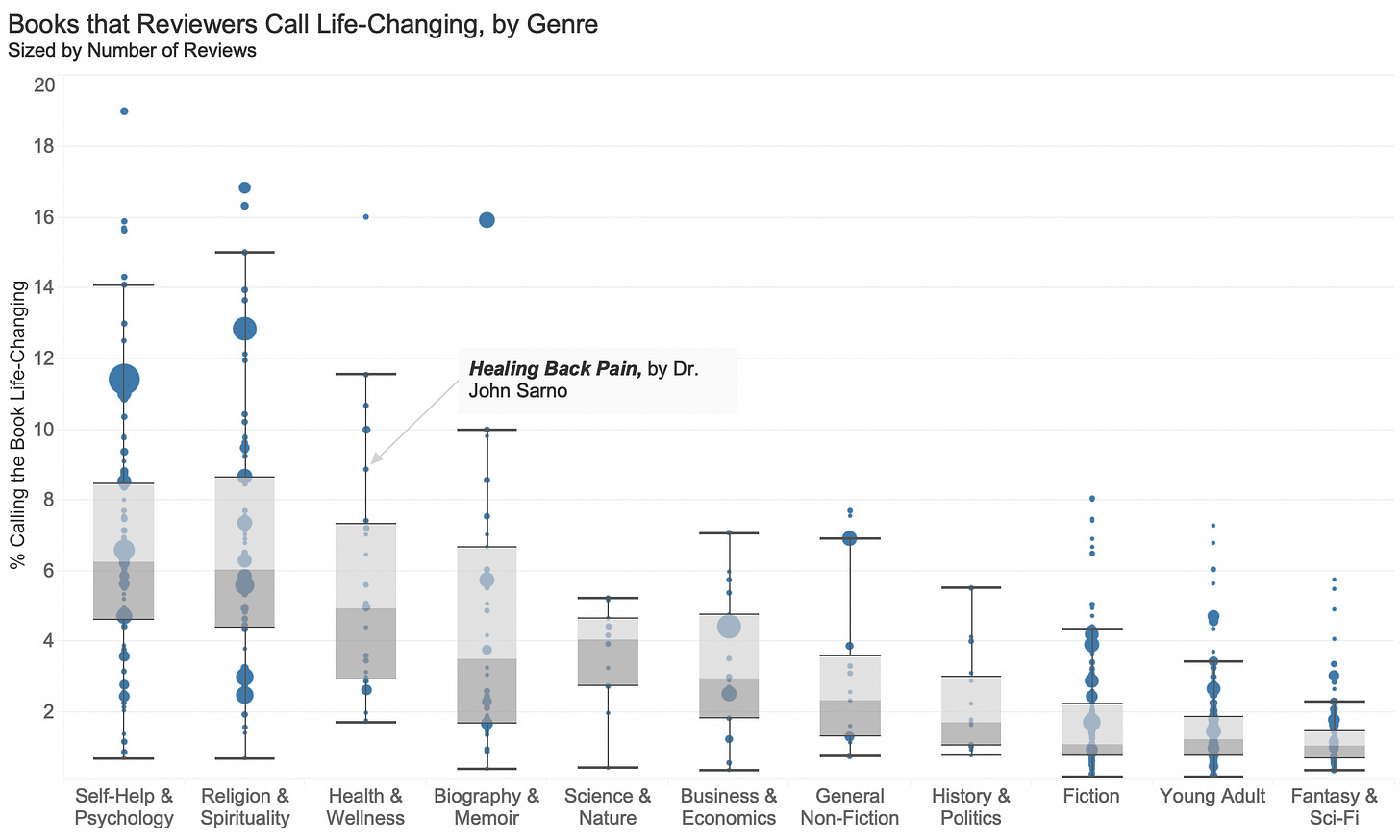
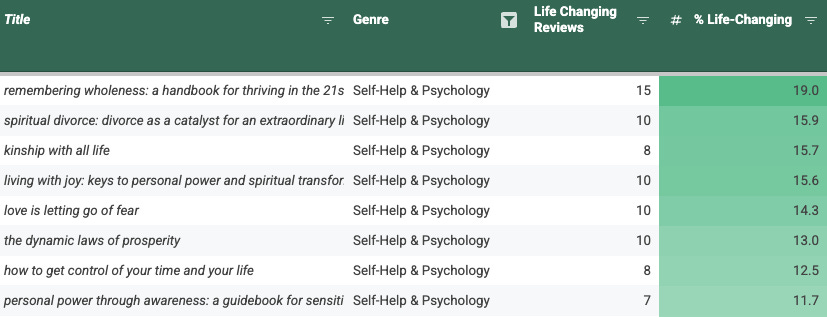
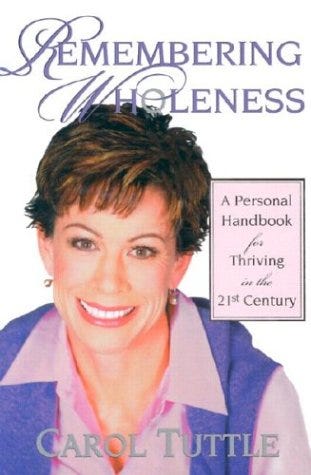
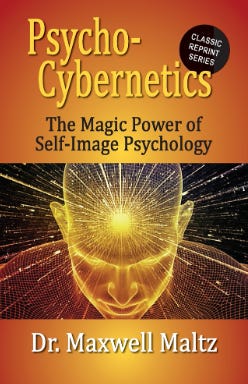
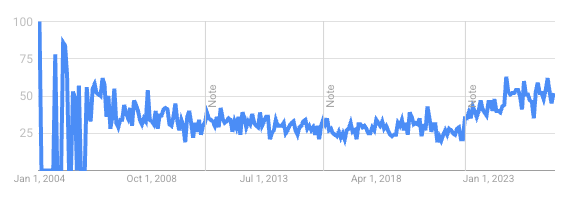
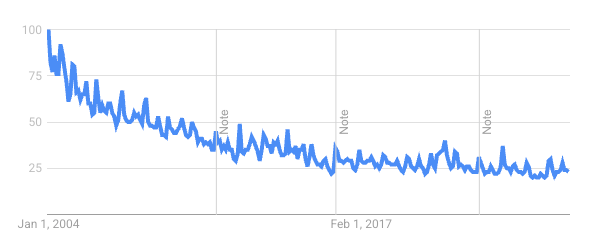
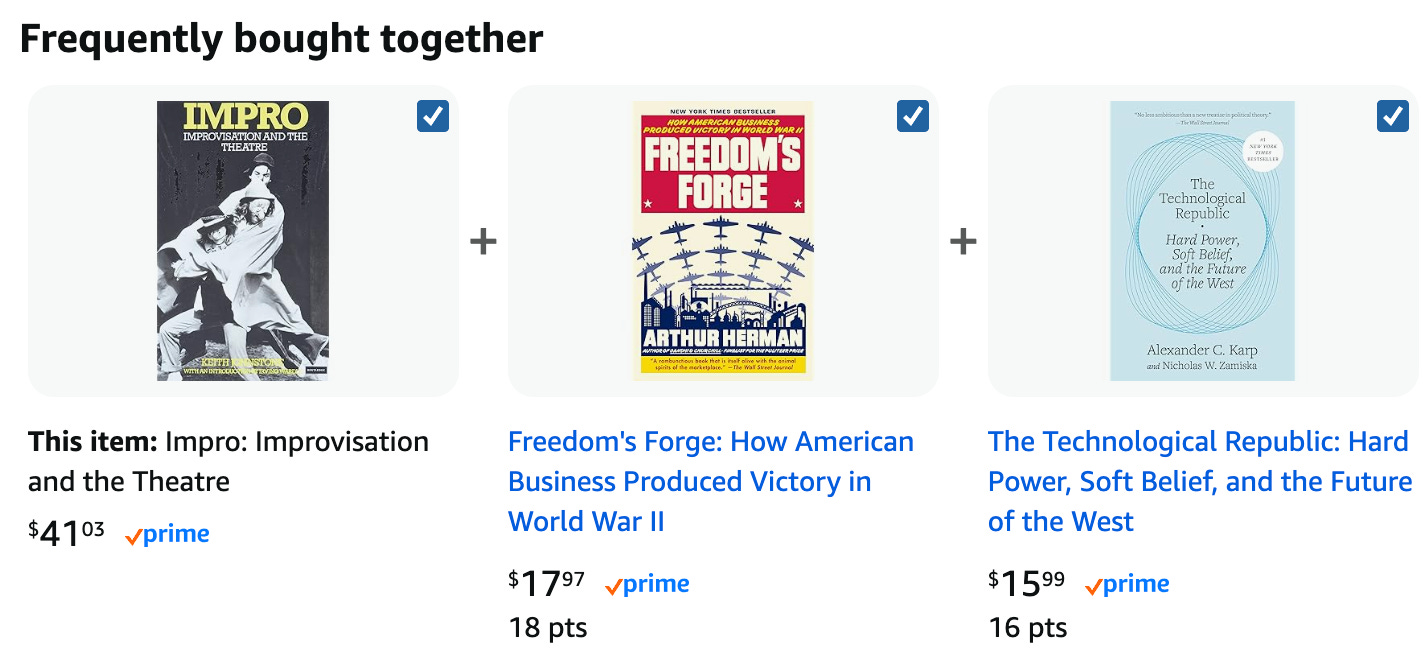
Nice one. But, you have put me off these books now. I don't want to risk changing my life.
Regarding Healing Back Pain, I have read, directly benefitted from, and have sent 5-10 copies to relatives and colleagues suffering various neck, back etc., pains and psychological abnormalities. I read the book in one sitting, and by the next day I was 100% cured after two years of back pain and I have yet to experience any further suffering in the last 37 years! The mechanism is simple. Our emotions are connected to the way our unconscious mind directs blood flow. Anyone who has blushed from embarrassment would acknowledge this. Thus the unconscious mind can deny blood to your back muscles, causing them to spasm, cramp, and feel pain. Once the patient understands this, the spell is broken and the mind stops its mischief. Admittedly, this is a bit of a thin explanation, but it is good enough that it does heal 88% of people who read the book.